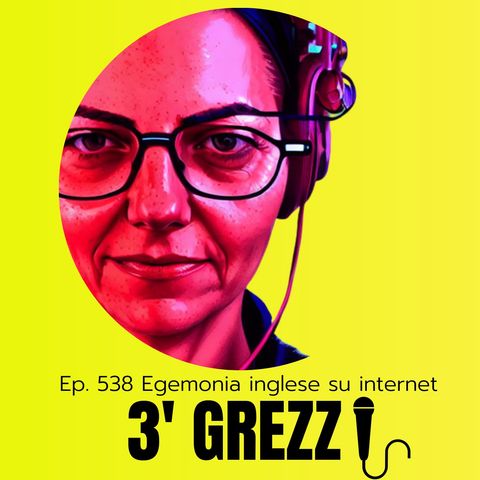3' grezzi Ep. 538 Egemonia inglese su internet

Download and listen anywhere
Download your favorite episodes and enjoy them, wherever you are! Sign up or log in now to access offline listening.
3' grezzi Ep. 538 Egemonia inglese su internet
Description
I paesi di lingua inglese sono appena il 5% della popolazione mondiale, ma i siti in lingua inglese sono più della metà di quelli pubblicati in tutto il mondo. Se...
show moreTRASCRIZIONE [ENG translation below]
Cominciamo sparando qualche cifra. Il 63% della popolazione mondiale ha accesso a internet. Parliamo di più o meno 5 miliardi di persone. E quindi quasi 5 miliardi di persone abitano in un sacco di posti diversi e parlano lingue diverse, e conseguentemente anche su internet dovrebbero esserci un sacco di lingue diverse. Giusto?
No, Sbagliato. Infatti, più della metà di tutti i siti pubblicati su internet, quelli che si possono accedere pubblicamente senza password, sono scritti in lingua inglese, e l'inglese è la lingua che stradomina tutte le conversazioni, anche tra persone che non parlano l'inglese a casa, quelle nazioni dove l'inglese non è la lingua parlata.
Infatti appena il 5% della popolazione mondiale ha l'inglese come come madrelingua, come prima lingua, però ripeto, più della metà di tutte le cose che vengono dette su internet vengono dette su siti che funzionano in lingua inglese.
Questo è un problema, non solo perché è una ulteriore dimostrazione dell'egemonia culturale, commerciale, tutto dei paesi di lingua inglese, ricordiamoci noi in Italia - e lo si dimentica troppo spesso - che avendo perso la seconda guerra mondiale noi siamo ancora una nazione più o meno occupata dagli alleati americani che impongono un sacco di cose: dalla politica nazionale alla disseminazione delle basi per fare i giochi di guerra e i vari esperimenti.
Ma non è di questo che voglio parlare oggi, volevo parlare delle conseguenze del fatto di essere costretti, essere costrette a usare una lingua diversa da quella che si conosce bene, quindi la propria lingua madre, per comunicare, soprattutto per fare commercio. E io me ne accorgo ogni volta che devo tradurre qualcosa di intrinsecamente italiano in inglese, è un problema. In questi giorni sto comunicando con gli Stati Uniti per un pagamento che mi devono fare e chiedetemi quanto è complesso mettere d'accordo il sistema fiscale italiano con quello degli Stati Uniti, anche la semplice traduzione di termini come partita IVA o codice fiscale, andate a spiegare la differenza tra partita IVA e codice fiscale, no?
Il problema è che nel futuro sempre di più si limiterà il numero di lingue usate su internet e questo porterà gravi conseguenze per le persone che non sono di madrelingua inglese. Quindi, pensiamoci.
TRANSLATION
Let's start by throwing some figures. 63% of the world's population has access to the Internet. We are talking about more or less 5 billion people. And so almost 5 billion people live in a lot of different places and speak different languages, and consequently there should be a lot of different languages on the Internet as well. Right?
No, Wrong. In fact, more than half of all sites posted on the Internet, those that can be accessed publicly without a password, are written in English, and English is the language that overrides all conversations, even among people who do not speak English at home, those nations where English is not the language spoken.
In fact just 5 percent of the world's population has English as their native, first language, however, I repeat, more than half of all things said on the Internet are said on sites that function in English.
This is a problem, not only because it is a further demonstration of the cultural, commercial, everything hegemony of the English-speaking countries, let me remind you that Italy -and we forget it too often - that having lost World War II we are still a nation more or less occupied by the American allies who impose a lot of things: from national policy to the scattering of bases to do war games and various experiments.
But that's not what I want to talk about today, I wanted to talk about the consequences of being forced, being forced to use a language other than the one you know well, so your native language, to communicate, especially to do business. And I notice that every time I have to translate something inherently Italian into English, it's a problem. These days I am communicating with the U.S. about a payment they have to make to me, and ask me how complex it is to get the Italian tax system to agree with the U.S. tax system, even the simple translation of terms like 'partita IVA' or 'codice fiscale', go and explain the difference between 'partita IVA' and 'codice fiscale', right?
The problem is that in the future more and more the number of languages used on the Internet will be limited, and this will bring serious consequences for people who are not native English speakers. So, let's think about it.
Information
| Author | M. Cristina Marras |
| Organization | M. Cristina Marras |
| Website | - |
| Tags |
Copyright 2024 - Spreaker Inc. an iHeartMedia Company
